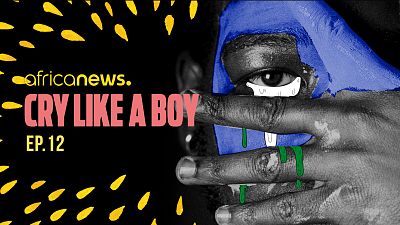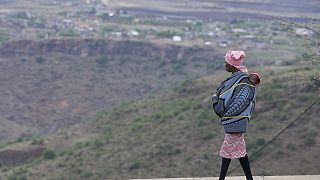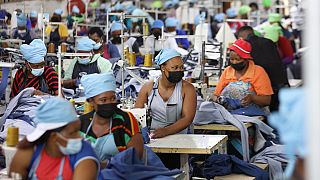Lesotho
The illegal miners, known as the zama zamas, not only put their lives at risk but also leave their families behind in countries like Lesotho and Zimbabwe for weeks at a time. These men leave their homes to seek employment in South Africa’s dangerous and illegal mines, ostensibly in an effort to provide for their families.
In this episode of Cry Like A Boy, we look at the pressure of being a zama zama with Mpiwa Mangwiro, an Advocacy Specialist for MenEngage Africa Alliance, and Rosalind Morris, an anthropology lecturer at Columbia University and producer of the documentary”‘We are Zama Zama” about illegal mine workers.
Like this episode? Share your thoughts on how you have challenged your view on what it means to be a man using the hashtag #CryLikeaBoy. And if you are a French speaker, this podcast is also available in French: Dans la Tête des Hommes.
Please do not hesitate to listen and subscribe to the podcast on euronews.com or Castbox, Spotify, Apple, Google, Deezer, and give us a review.
TRANSCRIPT: Banna Ba Mamaenara in Lesotho: Absent fathers
Khopotso Bodibe: Welcome to Cry Like a Boy, a Euronews original podcast series dedicated to revealing stories of men who are defying centuries-old stereotypes in five different African countries.
I am Khopotso Bodibe and I am a South African radio journalist and a professional who uses media for activism and advocacy around health and gender issues.
If you are new to the show, this podcast explores how the pressure to be “a man” can harm families and society. After having travelled to Burundi and Senegal, today we continue a discussion that started off in Lesotho, a small enclave kingdom surrounded by South Africa.
If you haven’t listened to the previous episodes, stop now and go back. You’ll hear the story of how the pressure to be a breadwinner for the family is destroying the lives of thousands of men and families in Lesotho, as men leave their homes to seek employment, ostensibly in an effort to provide for their families, in dangerous illegal mines in South Africa.
Today we continue exploring this topic with Mpiwa Mangwiro. Mpiwa is based in Johannesburg and is an Advocacy Specialist for MenEngage Africa Alliance, fighting to achieve gender equality by including men and boys as part of the solution.
We also invited to this podcast Rosalind Morris, who has taught anthropology at Columbia University for 25 years and has produced a documentary on the zama zama, the illegal miners who come to South Africa not just from Lesotho, but also from other neighbouring countries such as Botswana or Zimbabwe.
We remind you that these interviews have been recorded at separate times.
Khopotso Bodibe: In EP. 9 and 10 of this show, we heard from a man living in a rural and depopulated district of Lesotho, he tells us that all young boys around there “no longer look for safe, formal employment after finishing school, they all go to those illegal mines”. He has two sons, and he is afraid they will follow this path too. “Boys will always be boys and they may be interested in working in the zama-zama when they see others making a lot of money”.
But is this true Rosalind?
Rosalind Morris: You know, this is interesting, I asked people on the other side of the mines, and we know that very few people make any money. Hardly anything. The fantasy that one strikes it rich is ridiculous. Every once in a while, someone strikes it rich. What does this mean, really? It means that you might get forty-five hundred grand worth of gold. So three hundred US dollars worth of gold. You might live for four months on that.
This is not rich, but the fantasy of this possibility is enormously powerful. It circulates like wildfire in this world. So when people say, oh, let's go, we can get money quickly, we'll bring it back, it's the best way, this is going to be contradicted by experience very, very quickly and people have to live in the space of that contradiction. This is where the debt arises. This is where all of the anxiety about showing wealth that you don't have arises.
But when I ask people, why don't you tell people back home that this is not real? They tell me something very interesting. They say that the very fact that one person does well or that someone is able to, for example, acquire a motorcycle or maybe can squat in a house that looks grander than what is available at home, that to deny anyone else the capacity to try for that would be considered by those other people to be an act of violence in and of itself, a foreclosure of that other group persons possible future.
And so they're willing to traffic in this fantasy, or at least not to reveal it for its duplicity. And this, I think, is a big part of the continuing industry. Nobody is getting very, very rich except perhaps a few gangsters and not just gangsters that you would imagine, you know. In the area where I work, I know there are white suburban residents who are asking the men who garden for them to take some money and buy gold and act as buyers and they become, you know, suburban gangsters who can take gold into a shop and sell it and have no questions asked.
SOUNDBITE FROM THE DOCUMENTARY: WE ARE ZAMA ZAMA
They are not all constantly being robbed underground, but they are afraid of being robbed underground all the time.
It happens people are press-ganged and you know, it's a space where, as in so many informal communities, there are incredible forces, organised forces of criminality, and there's everyone else who's living in an effort to avoid it. And I think one of the big risks in the discourse about zama zama in South Africa is that these people are themselves the heart of the criminal problem, whereas in fact, these people, that is those who are going underground are primarily the victims of that criminal problem.
Khopotso Bodibe: In some countries such as Zimbabwe, where the protagonists of Rosalind Morris’s documentary come from, the urban youth is crushed between structural poverty and unemployment while the rigid patriarchy is eager for emancipation. And young boys end up employed as zama zama in South Africa. I would like to address with Mpiwa the influence of this rigid patriarchy in such a delicate passage from adolescence to adult life. When are the first decisive choices made?
Mpiwa Mangwiro: I think the reality is that when the passage between adolescence and young adulthood is that passage where people's understanding of what is, and what is not acceptable, are really formed in that passage, which begins to heavily shape the environment that begins to heavily shape and define what is expected of individuals.
So you find that when these rigid forms of masculinity, they are influences that put pressure on young men to begin to act in certain ways. For instance, without linking it to the extractive industries, I would link it to what used to happen in South Africa. That there was this norm that was accepted, that is at a certain age, a young teenager or a young man should have slept with a woman or should have slept with a girl.
And if you have not done that, it was sort of like a disgrace to the boy code. So you find that that kind of rigid masculinity puts pressure on young men to begin to behave in certain ways that may be harmful to other members of society. We have high statistics of rape in South Africa, and when you trace it back, you find that some of the people who are adults now, and who are rapists now, are people who manifested or embraced it.
That behaviour is a result of trying to live up to these rigid masculinities. So you find that in the same vein, young men end up being the zama zama, end up being caught up in criminal activities. What happens within this context is because they are trying to live up to the definition of what a man should be. Aggressive women and men should live up to this form of being aggressive, for being able to fight, being able to provide.
And they begin to shape the perceptions of teenagers through to adulthood. And as time goes on, they become entrenched behaviours that they continue to manifest even as they progress in their adult years. And they're also in checkmate, because what it means is if you cannot live up, if you are able to live up to that form of masculinity, you have now enslaved the way you have to continue to behave in that way for you to continue to retain the power and influence that you have as a man.
And whereas if you can't live up to that, it also then comes in emasculation, because you are not man enough. You are not a man. You are not living up to societal expectations. You're not living up to the code of being a man. So you find that it also impacts young boys and teenagers into trying to behave in certain ways, some of which are also harmful for them. But because of society, peer pressure, and home, the things that they are exposed to and what they are seeing, their own families, their own communities around behaving the way that they are seeing them behaving, then they feel compelled to live up to that.
And yet certainly they do need emancipation from that because that is entrapping them to perpetuate certain behaviours that are also toxic to them. The violence becomes toxic to them. That behaviour that they engage in becomes harmful to them and those around them, whereas those who cannot live up to those expectations live with the constant tag of feeling inadequate.
Khopotso Bodibe: Contrary to what you would expect, however, the hyper-masculine space of the mine could be for many men a safe space to talk about issues they would not necessarily address in other environments. Rosalind Morris, what can you tell us about this?
Rosalind Morris: I mean, people speak about it, sexual violence, as in all post-slaving, post-colonial societies is widespread among both white and black communities. But it's especially widespread in communities where there's no functioning state. I mean, basically, these are areas from which the state has withdrawn. Police don't come, ambulance's don't come. There are very few services or any of the infrastructures of the state.
So in that kind of space. You know, the person with the biggest d*ck gets to do what they want. And they do. And, you know, as with every community and all sorts of different positions on this, in my experience among the young men with whom I work, they're extremely concerned about it. They talk about it a lot. They're afraid both for the women in their lives and for themselves. They speak about both of these things. One of the young men with whom I work is very devoted to the idea of peer education. I use that formal term. He wouldn't. That is, talking to other men his age about the need to fight sexual violence against women.
So it's very present. People don't shy away from the discussion and they are enraged, actually, by the fact that they cannot call on the police or the state to help in moments when there is extreme sexual violence or any form of violence. And often that precipitates in more intense kinds of social conflict, I would say.
Khopotso Bodibe: So what are the elements of toxic and healthy masculinity underground?
Rosalind Morris: Well, I don't know that it's so easy to draw a line between toxic and healthy masculinity or whatever. What I would say is that underground I've heard young men talk a lot about what they inherit, you know, what traditions come to them and how much they are able to refuse what their elders did or what their elders want.
And they are trying very hard to change themselves. I mean, this is the beginning of a movement away from anything that you might want to call toxic. And what we call toxic now won't be the same in 20 years. But they know that some of the habits and patterns of their parental generations, sexual relations are not to be reproduced. And they think about it.
I mean, it's a huge range of people. Yeah, so for some young men, they feel that alcohol is a big problem. And for many young women as well, alcohol has deemed a kind of demon in the mix for force. For some people, the fact that you know, people are spread across the whole southern region, separated from each other, inevitably this is going to lead to multiple relations and multiple households.
Well, when people are trying to support two or three households, everyone's going to be in debt and things are going to collapse, but most of the people with whom I work are people who are in reasonably ordinary relationships, you know.
They are there and they fear violence and they fear that kind of violence, which is borne of bravado. They speak about that, the kind of violence that is theatricalism. Where someone wants to demonstrate their strength by their capacity to injure someone else, that's I think probably a key element. But they also live in a world where they themselves want to be known. So, you know, this desire for recognition can be either a positive force or an incredibly destructive force.
Khopotso Bodibe: The world of zama zama is highly ethnicised. People speaking the same language or from the same ethnic minorities stick together. Professor Morris calls it “the terrible ghost of apartheid”. Everything in South Africa is ethnicised.
And it’s important to understand that the notion of masculinity, but also what it means to be a man, differs in South Africa. What are the different forms of masculinity that live in South Africa nowadays? And what are the common challenges that overcome the heritage of segregation and apartheid? Mpiwa what do you think?
Mpiwa Mangwiro: Thank you. I think I touched a bit on them, one of them being the hegemonic masculinity which sees all over things that it means to behave and men are supposed to be powerful means protective and supportive of aggressive and supposed to be.
That's one of the forms of masculinity that we see in the country. And unfortunately, because of the high statistics of rape and violence, we see that there's a lot that comes from that. And then there's another form, which is the complacent masculinity where it sort of complies with the hegemonic expectations because it does not challenge the status quo. You find that they are people who, while they may think that there's something wrong with the violence, and so therefore they're not challenging, they're not doing anything about it, it's not challenging the status quo.
That is something that we are with, that we are also seeing. But then we are also seeing that there is also now a rise of this notion of trying to promote a positive form of masculinity where a number of organisations are not trying to be challenged to say you do not have to live up to these expectations because these expectations can harm you in these different forms that we have that I've been talking about. That sometimes drugs, you know, violence, this is all part of trying to live up to hegemonic masculinity.
And yet it's very toxic. And so you find that these are a challenge - also because of the country's history, where there's been a lot of absenteeism from a father's legacy, there's a lot of absent fathers left in the country because of its history with apartheid, where men had to leave home to also go fend in the mines and so forth, which created this gap - and young men end up having to give up, looking up to people whose forms of masculinity are not necessarily the best. And the country is still grappling and going through the process of then trying to move towards building positive forms of masculinity that depart from the harmful norms.
But of course, it is a process because there is a lot that needs to be dismantled from those structures.
Khopotso Bodibe: Professor Rosalind Morris, what are your thoughts on the role played by education in trying to fix some of the issues we just heard?
Rosalind Morris: I'm an educator, so I believe in education. And I believe education is the only means by which people can change their minds.
The people who are coming from Zimbabwe into the informal sectors and into the mining sector are often not as uneducated as you might imagine. College students come to work periodically to pay their fees. People who were hoping to finish school to go into ordinary kind of business tracks like tourism or hotel management or whatever, who found themselves cast out of school at the 11th, what we would call in here in the US, 11th grade, they are zama zama. There are always people who have only two or three years of education who are zama zama-ing. So it's a hugely diverse group and there are all sorts of different levels of education
SOUNDBITE FROM THE DOCUMENTARY: WE ARE ZAMA ZAMA
Rosalind Morris: Unfortunately, because so many of these people are now illegal migrants in South Africa, their children cannot get access to schooling. And this is a new generation that is going to have a fragmented ad hoc education. I think that's a huge problem for the future as much as the lack of education was a problem in the past. The migrants from Zambia, from Zimbabwe and Botswana are not as uneducated, but their children will be.
OUTRO
Khopotso Bodibe: This show has been produced by me, Khopotso Bodibe, in Johannesburg; Pascalinah Khabi in Maseru, Lesotho; and Lillo Montalto-Monella, Marta Rodríguez-Martinez, Naira Davlashyan, Arwa Barkallah and Mame Peya Diaw, in Lyon.
Special thanks go to Lory Martinez, Clizia Sala and Studio Ochenta for helping us produce this podcast. The theme music is by Gabriel Dalmasso.
I would like to thank our guests, Mpiwa Mangwiro and Rosalind Morris.
We remind you that this podcast is at the heart of a multi-format project, which also includes video portraits, web articles and op-eds. You can find more information on Cry Like a Boy here.
Follow us on Twitter @Euronews and on Instagram on @Euronews.tv
If you are a French speaker, this podcast is also available in French "Dans la Tête des Hommes". In the French episode, we invite the woman leading an 18 month-long strike of cleaning ladies in a hotel in Paris, and with a sociologist from Gabon who knows a lot about invisible workers".
Please do not hesitate to listen and subscribe to the podcast on euronews.com or Castbox, Spotify, Apple, Google, and Deezer, and let us know what you think.
Also, don’t be shy to share your own stories with us of how you changed and challenged your view on what it means to be a man using the hashtag #crylikeaboy.
Next stop, Guinea, where we will explore the stigma that men face after failing to reach Europe.



















01:05
Lesotho declares two-year state of disaster amid US tariff fallout
01:51
Somalia celebrates the International Day for Women in Maritime
02:13
Congo’s rebel-held coltan mines continue to pump ore for world’s tech
Go to video
Ghana moderators sue Meta over harm from reviewing extreme content
Go to video
219 rescued from human trafficking and cybercrime ring in Ghana
Go to video
Prince Harry accused of orchestrating a bullying and harassment campaign